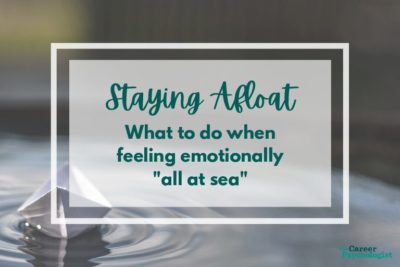
18th Aug 2021
Staying Afloat
What to do when feeling emotionally “all at sea”
When we get overwhelmed with distressing emotions or unwanted thoughts it’s a bit like being brought out to sea by a strong current into the middle of the ocean. If we don’t know what to do we can feel tired, frightened, exhausted and alone. Our mind might be telling us there’s no way back, our breathing can get faster and as we struggle to stay afloat by treading water or trying to swim against the current, it can feel exhausting and terrifying. Sometimes our mind might even tell us that drowning might be a good way to relieve our distress. One thing is for sure, the more we struggle the faster we will sink!
 To a poor swimmer, doing “nothing” in such a situation would be counter-intuitive, in fact they just wouldn’t think of it. But to an accomplished swimmer, lying flat on the water comes naturally and easily. This is how one person describes their experience of staying afloat:
To a poor swimmer, doing “nothing” in such a situation would be counter-intuitive, in fact they just wouldn’t think of it. But to an accomplished swimmer, lying flat on the water comes naturally and easily. This is how one person describes their experience of staying afloat:
“I swim out and just lie on my back in the ocean, allowing ripples to pass under me. When larger ripples or waves surprise me I accept this, knowing that the moment will pass and the uncomfortableness I feel will not last forever. Sometimes, after I float for a while I look up and can see I’ve been carried away by the current and I know what to do. I don’t swim against it, instead I either let myself go with it until it brings me back to shore or I swim sideways instead, without tiring myself. While I lay back I can even notice the feeling of the sun on my face, the sound of the gulls, the smell of the sea, the sensation of buoyancy and the taste of salt on my lips as I allow myself to think about the things I am grateful for. Then, when I’m out of the current I will swim into shore and be with the people I care about. The worst that will happen is that I may be 100 metres further down the beach but I won’t have tired myself out and I won’t have drowned”.
Sometimes, we can feel overwhelmed with distressing feelings, physical unease or unwanted, judgmental thoughts, particularly in quieter times or when feeling under stress. These thoughts are just like the ripples in the ocean; they never stop but they always move on past us. Some are small while others are larger waves, which hit us unexpectedly and can knock us off-kilter. Sometimes, life can even feel like we are caught up in an overwhelming current of emotion. This can occur in any life domain including work and careers, personal lives, relationships or individual general health and wellbeing. The good news is that ways to deal with life’s waves and emotional currents can be learned and practised, so they don’t have to overwhelm us. Indeed, just like we can learn to stay afloat in the ocean we can learn to stop struggling, lie back and wait for our unwanted thoughts and feelings to pass us by. For some people this might involve getting help from a psychologist, coach or therapist, for others it may be helpful to start with mindfulness exercises to help them to focus on our breathing and connecting with their five senses (what they can see, feel, smell, taste or hear), until they come safely back to shore.
 Mental health problems can arise for many of us in the workplace. The above metaphor was developed in collaboration with two clients who gave consent for this to be published to help others. Both individuals are highly successful business executives; one of whom suffered from work-related anxiety and panic attacks and another who suffered from chronic depression and at times could become submerged in suicidal thoughts. If you’re struggling with your mental health in your career or working life, you may benefit from having a quick chat with a career psychologist. A good starting point may be to have a look at The Career Psychologist website (https://www.
Mental health problems can arise for many of us in the workplace. The above metaphor was developed in collaboration with two clients who gave consent for this to be published to help others. Both individuals are highly successful business executives; one of whom suffered from work-related anxiety and panic attacks and another who suffered from chronic depression and at times could become submerged in suicidal thoughts. If you’re struggling with your mental health in your career or working life, you may benefit from having a quick chat with a career psychologist. A good starting point may be to have a look at The Career Psychologist website (https://www.
Executive Coaching, Getting Unstuck coaching
Subscribe to the blog
What we’ve been writing about
The Getting Unstuck process steps
Latest Tweets
-
 A thought provoking read from our own Naomi de Barra about mobile phones and how they, in her experience, disrupted… https://t.co/4SzhT2lWj0
A thought provoking read from our own Naomi de Barra about mobile phones and how they, in her experience, disrupted… https://t.co/4SzhT2lWj0
-
 On #WorldMentalHealthDay , like every other day, take a moment to look after yourself and your wellness "If you d… https://t.co/326PA9fVYh
On #WorldMentalHealthDay , like every other day, take a moment to look after yourself and your wellness "If you d… https://t.co/326PA9fVYh
-
 We'd love to hear what books or items improve your mental health & wellbeing? Here are 3 of ours: 1. The Happine… https://t.co/mtXyNlg6nk
We'd love to hear what books or items improve your mental health & wellbeing? Here are 3 of ours: 1. The Happine… https://t.co/mtXyNlg6nk

